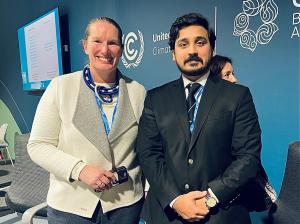— Osama Rizvi
BAKU, AZERBAIJAN, December 5, 2024 /EINPresswire.com/ — The Society for Low Carbon Technologies (SFLCT), a non-profit organization dedicated to advancing the energy transition, played a pivotal role in highlighting the challenges faced by the Global South at the 29th Conference of the Parties (COP29) in Baku, Azerbaijan, organized under the United Nations Convention on Climate Change (UNFCCC). Osama Rizvi, the SFLCT’s Greater Middle East Chair, served as the organization’s official representative and delegate.
As a result, Rizvi met with the World Bank’s Director of the Environment Department through Dr. Valerie Hickey, following her participation in an event on super pollutants. Of particular importance was Hickey’s emphasis on the critical need to address these pollutants, especially in regions like Pakistan, where Rizvi resides.
This aligns with Rizvi’s practical experience in decarbonization and tackling smog-related challenges, including his execution of Pakistan’s first low-carbon agreement in early 2024. The World Times Institute’s (WTI) videocast, “Pakistan, Climate Change, Smog, and Its Solutions,” also illustrates his vision for transformative change and that of the SFLCT’s.
Rizvi added that Hickey stressed the urgency of prioritizing super pollutants as an emergency measure in the global effort to limit warming to 1.5°C. This comes at a time when Pakistan’s Punjab province has declared a health emergency owing to historic pollution levels, resulting in the closure of schools and construction sites. The province has emphasized the necessity of establishing mobile clinics to treat respiratory ailments.
Moreover, Hickey outlined three key points: first, the situation represents a public health emergency with long-term implications; second, the time for advocacy has ended, and immediate action is required; and third, effective solutions are achievable, as evidenced by progress in cities such as Beijing and Mexico City.
This brings additional parallels to light: the SFLCT’s Chairman of the Board, Fernando C. Hernandez, who is of Mexican descent, recounted his 1980s Mexico City smog experience by way of the WTI’s Pakistani videocast, which he recorded with Rizvi.
Hernandez recounted living through smog deterioration and its impact, and he highlighted specific solutions implemented in Mexico that Pakistan and other regions facing similar challenges can leverage. Rizvi remarked, “Like the SFLCT, the World Bank focuses on Global South smog, but the founders of the SFLCT differ from other organizations because we experienced poor air quality as children in Mexico and Pakistan.”
What happens next? Following his meeting with the World Bank and other stakeholders committed to action beyond rhetoric, Rizvi affirmed a common consensus: the necessity of taking tangible, immediate steps.
Through climate diplomacy, and with his decarbonization expertise (outlined earlier), Rizvi aims to draw on insights gained from COP29 stakeholders to improve air quality programs in Pakistan.
Rizvi expresses how Hernandez’s involvement in low-carbon diplomacy, foreign affairs, and policy strengthens the SFLCT’s global presence, enabling it to address crises like smog through its global low-carbon allies. Such allies can significantly strengthen South Asia’s resilience via international collaboration.
Attending COP29, Rizvi noted, demonstrates the value of connecting and activating additional partners, particularly as the global population surpasses the 8-billion-person mark.
However, Pakistan’s challenges are symptomatic of the wider developing world, underscoring the dire need for a robust international collaboration platform that transcends national and governmental boundaries. And this is where he sees the SFLCT bridging the developed-and-developing nation gap that tends to exist, which can at times leave nations in the Global South the most vulnerable. This is more evident as the world continues to grapple with the energy transition.
Press Relations
Society for Low Carbon Technologies
email us here
Legal Disclaimer:
EIN Presswire provides this news content “as is” without warranty of any kind. We do not accept any responsibility or liability
for the accuracy, content, images, videos, licenses, completeness, legality, or reliability of the information contained in this
article. If you have any complaints or copyright issues related to this article, kindly contact the author above.
![]()






